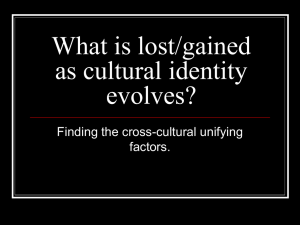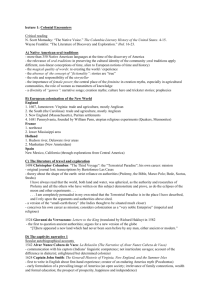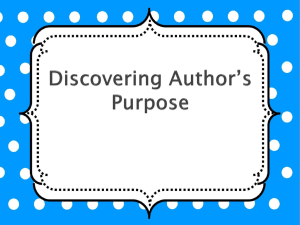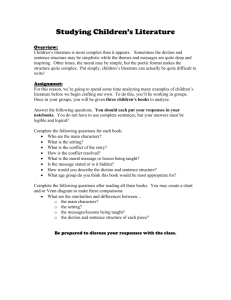Author*s purpose
advertisement
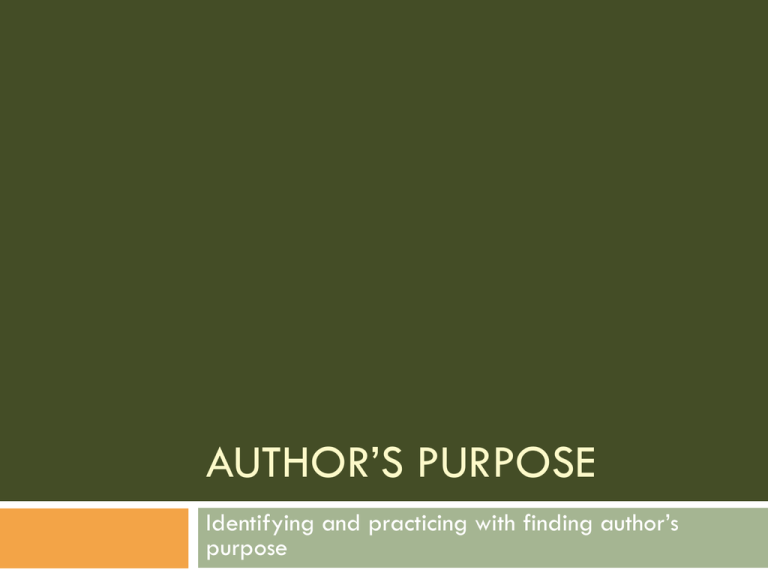
AUTHOR’S PURPOSE Identifying and practicing with finding author’s purpose Review: What is author’s purpose? Write this on your “white board”; write it on the yellow side if you are unsure and one the green side if you are sure. Author’s purpose: why the author writes the piece. Different purposes Authors write to… Inform Teach Entertain Persuade Identify purpose It was a glorious morning in Alabama. The sun was shining through the trees. Alan couldn't wait to find his fishing pole and call his friend Sam to go fishing. They had a great time on these early morning fishing trips. They took their dogs with them and the dogs would swim in the lake while they fished. It was so funny to watch those dogs paddle around the lake. Identify Purpose The Slim-O-Matic will cause you to loose pounds and inches from your body in one month. This amazing machine helps you to exercise correctly and provides an easy video to show you the proper way to exercise. Send $75.99 and begin exercising today. Identify Purpose The Underground Railroad was a secret organization which helped slaves escape to freedom. Many slaves were able to escape because of the conductors and station masters. The northern states were free states and slaves were free once they arrived in the north. Secret codes and signals were used to identify the conductors and station masters. Review: What is Satire? a form of social commentary (can be protest) that ridicules something in order to INSPIRE CHANGE To make it SATIRE one must… Have a point Want to inspire change THUS! The author’s purpose in a parody/satire is… To ENTERTAIN To PERSUADE Dora the Conquistador Dolls (P3) Read this article to yourself and highlight anything that might be following the purpose TO ENTERTAIN To Persuade What does this ridicule? “Dora the Explorer” Why are they ridiculing it? It is humorous (to entertain) It is familiar (most know about it) It connects modern “conquests” to former “conquests” What are they trying to convince you? Consumerism is slightly out of control Conquistadors are falsely heroized. How do you know the MAIN purpose? For it to be satire…it must inspire a change in: Mentality Action Explorers can be seen in different ways: Heroes Villains Narratives Accounts tell the story of real-life events useful to historians and other researchers as primary or secondary sources Primary sources Firsthand accounts: created by people who lived through significant historical events. often biased: may reflect the writer’s personal “slant” or one-sided perspective. Secondary sources Secondhand accounts: written by people who researched the events but did not directly witness or experience them. more objective: may lose immediacy and accuracy. Two we’ll look at Narrative Account Journal Primary or Secondary? Names to Know Alvar Nuñez Cabeza de Vaca García Lopez de Cardenas Christopher Columbus Alvar Nuñez Cabeza de Vaca Exploration narrative writer: “A Journey Through Texas” through FL (2nd command) Unfriendly conditions=Shipwreck on the way to Mexico. Journey 60 men survived Washed upon the shore at Galveston, TX. 15 lived through the winter 3 survived to the end of the journey (18 months of wandering) Journey sparked exploration of Texas. Always encouraged others to explore America García Lopez de Cardenas Credited with being the first European to explore the Grand Canyon (1540) Searching of “Cibola”—stationed near what was rumored to be one of the 7 cities of gold. Was dispatched on a mission to find a great river Found it Couldn’t get to it Christopher Columbus Originally from Genoa, Italy. Explored from a young age—had bigger dreams Petitioned Portugal for the funds Turned him down Petitioned King Spain Ferdinand and Queen Isabella accepted Left in 1492. Think of a time when you explored something. This can be a new place, a new school, a new store, a purse, a subject, anything that you explored. What did you explore? Where were you? What was the purpose of your exploration? Did you learn anything new? What are some of the details of your exploration? A narrative can encompass any type of exploration! In what way can narrative accounts be seen as a timeless art? What’s the purpose of an exploration narrative or journal? Inform? Teach? Entertain? Persuade? STYLE Author’s style How they write what they write Diction (word choice) Emotion Figurative language Descriptions Diction: Signal words Passage Signal Words Purpose 1. On that same day many fell sick, and on the next day eight of them died. On that same day; On the next day Indicates a time shift 2. We called them “of the cows,” because most of the cows die near there. Because Indicates a reason for something happening 3. What from the top seemed easy was, on the contrary, rough and difficult. On the contrary Indicates a contrast— compares 2 or more things. 4. They entreated us not to be angry any longer, because, even if it was their death, they would take us where we chose. 5. The next morning all those who were strong enough came along, and at the end of three journeys we halted. 6. The people who heard of our approach did not come out to meet us, but we found them at their homes. Comparing works Writer Landscape and cultural details Writer’s reaction Cabeza de Vaca Lopez de Cardenas Cabeza de Vaca Similarities Lopez de Cardenas Act 1 With your group create the following chart and find details from the text Act 2 Now, think about how these ideas are similar and different by creating a chart like this one Act 3 Discuss the following question and then write your response in your notes. Make sure you have at least 3 supporting details to back up your response: Which narrative do you think is more effective? Consider author’s purpose and style in your response (diction, word choice, verb usage etc) Answer Supporting detail 1 Supporting detail 2 Supporting detail 3 Diction: verbs Why do strong verbs help us SEE what’s going on? Find some examples in “Boulders Taller” and “A Journey” Consider as you read Purpose Style Diction Signal words Verbs Columbus’ Purpose Descriptions “I went ashore, and found no habitation save a single house, and that without an occupant: we had no doubt that the people had fled in terror at our approach” (60). “A thousand different sorts of trees, with their fruit were to be met with, and wonderfully delicious odor” (61). “I discovered also the aloe tree, and am determined to take on board the ship tomorrow, ten quintals of it, as I am told it is valuable” (61). “If the weather serve, and sail round the island, till I succeed in meeting with the king, in order to see if I can acquire any of the gold, which I hear he possesses” (62). Purpose
